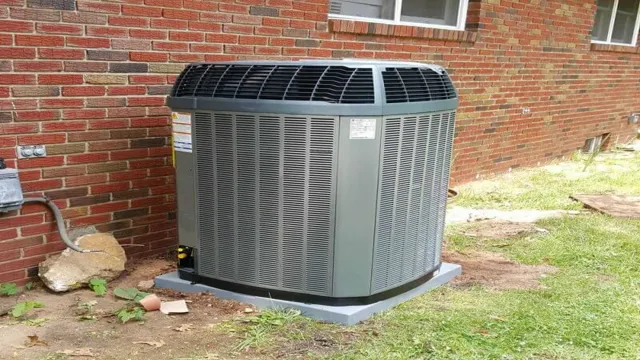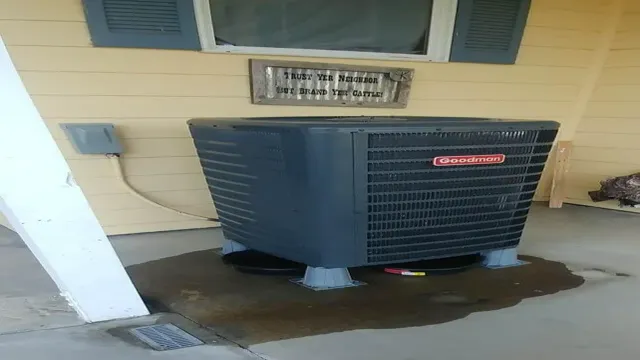If you’re an HVAC owner, you’ve likely encountered a heat pump dripping water at some point, and it can be mystifying and concerning to see. It’s crucial to understand the causes of a heat pump leaking water so that you can take corrective action before it deteriorates into a serious issue. In this blog post, we’ll go over the causes of a heat pump dripping water, how to detect the source, and the possible solutions to resolve the issue.
By the end of this post, you’ll be equipped with everything you need to know to prevent a leaking heat pump from costing you time and money.
What is a heat pump?
If you own a heat pump, you might be wondering why it’s dripping water. To put it simply, heat pumps work by transferring heat from one place to another, usually from outside to inside. When this process happens, condensation can form on the surface of the heat pump.
The dripping you see is likely water that has condensed on the unit and is now slowly dripping off. This is completely normal and nothing to worry about. However, if you notice excessive dripping or puddles around your heat pump, there may be an issue with the unit that needs to be addressed.
In any case, regular maintenance and inspections can help prevent problems and ensure that your heat pump continues to function properly.
Description of a heat pump and its purpose
A heat pump is a versatile HVAC (Heating, Ventilation, and Air Conditioning) device used for both heating and cooling purposes. It extracts warmth from the outside air or ground and circulates it inside, thereby heating your home during winters. In summers, it reverses the process, extracting heat from indoors and expelling it outside to cool the house.
Simply put, it works like a refrigerator but in reverse. The heat pump contains three main components, namely the condenser, evaporator, and compressor. The compressor compresses the refrigerant, which is then circulated through the condenser and evaporator, alternately absorbing and expelling heat to regulate the indoor temperature.
Heat pumps are energy-efficient, eco-friendly, and sustainable alternatives to traditional heating and cooling systems. They can operate at temperatures as low as -15°C, making them suitable for all seasons and climates. Overall, investing in a heat pump offers a cost-effective and long-lasting solution to your home’s heating and cooling needs.

Why is my heat pump dripping water?
If you’ve noticed your heat pump dripping water, don’t panic just yet. This is a common occurrence with heat pumps and can be caused by a few different factors. The most likely culprit is a clogged condensate drain line.
When your heat pump operates, it removes moisture from the air and collects it in a condensate pan. This water is then supposed to flow out through a drain line. If this line becomes clogged, the water will back up and start dripping from the unit.
Another possibility is that your heat pump is producing too much condensation, which can overwhelm the condensate pan and cause it to overflow. If you’re not comfortable troubleshooting the issue on your own, it’s best to call in a professional to take a look. They can quickly identify the cause of the problem and propose a solution to restore your heat pump to proper working order.
Possible causes, including condensation and refrigerant leaks
If you’ve noticed water dripping from your heat pump, there could be a variety of reasons for it. One possible cause is condensation, especially during periods of high humidity. As your heat pump cools the air in your home, it also removes moisture from the air, which can collect on the outside of the equipment and drip off.
Another possibility is a refrigerant leak, which could cause ice to build up on the unit and then melt, leading to water dripping. It’s important to address either of these issues promptly, as they could lead to more serious problems with your heat pump and potentially cause damage to your home. A professional HVAC technician can diagnose the cause of the dripping and suggest the appropriate course of action.
In the meantime, you can help prevent condensation by keeping your heat pump clean and minimizing humidity in your home through the use of dehumidifiers or ventilation fans.
How can I fix the issue?
If you have a heat pump dripping water, there are a few things you can do to fix the issue. First, check to see if the condensation drain is clogged. A clogged drain can cause water to leak from the unit.
Try using a wet/dry vacuum or a wire hanger to clear out any debris from the drain line. Next, check the air filter. A dirty air filter can restrict airflow, causing ice to form on the unit.
This ice can eventually melt and cause water to drip from the unit. Replace the filter if it’s dirty. Finally, make sure the unit is level.
If the unit is not level, water can collect in certain areas and drip from the unit. Using a level, adjust the unit as needed. By taking these steps, you can fix your heat pump and prevent any further water damage.
Tips for DIY troubleshooting, such as checking drainage and cleaning filters
If your plumbing system is acting up, it can be frustrating and inconvenient. But before you call in the professionals, there are a few things you can try on your own. One common issue is drainage problems, which can lead to slow flow or even standing water.
Start by checking any visible drains for clogs and removing any debris you find. Another potential culprit is a dirty filter, which can cause issues with water pressure and make your system work harder than it needs to. Take a look at your filters and clean or replace them as necessary.
By taking these simple steps, you may be able to fix the issue without the need for costly repairs or assistance. So next time you encounter plumbing troubles, don’t panic – try a little DIY troubleshooting first.
When to call a professional and what to expect from a repair service
When facing a faulty appliance or system, the first thought usually revolves around fixing it by oneself. While small issues can be resolved with basic DIY techniques, calling in a professional repair service is the safest bet for significant problems. Attempting to fix something without the necessary expertise could lead to further damage or even hazards.
Hiring a professional has many benefits, such as ensuring the issue is correctly diagnosed, proper repairs are made, and warranties are upheld. Additionally, professionals have access to the latest technology and tools, ensuring that the problem is fixed efficiently. When calling a repair service, expect them to arrive promptly, assess the issue and provide an estimate, and then proceed with the repairs with your permission.
By calling a professional, the likelihood of resolving the problem correctly and efficiently is increased, ensuring that your appliances operate correctly and for more extended periods.
Preventive maintenance for a leak-free heat pump
If you own a heat pump, you might have noticed it dripping water. This could be a sign of a minor issue but if not taken care of, it could lead to significant damage. Luckily, a simple preventive maintenance routine can keep your heat pump running smoothly and leak-free.
One critical step is to regularly clean or replace the air filter. A dirty air filter can cause the heat pump to work harder, which increases the likelihood of water leakage. It’s also important to check the refrigerant levels and ensure they’re adequate.
Low refrigerant levels can cause the evaporator coils to freeze, leading to water leakage. Lastly, make sure to inspect the outdoor unit and ensure it’s free from debris and dirt which could block drainage. By performing these basic preventive measures, you can significantly reduce the risk of your heat pump dripping water and extend its lifespan.
Routine tasks to keep your heat pump in good condition and avoid water leaks
If you own a heat pump, you should know that regular maintenance is crucial to keeping it in tip-top shape and avoiding water leaks. One of the easiest things you can do is to clean or replace the air filter every month. Clogged filters can lead to poor airflow, putting added stress on your system, which can cause it to leak.
Another important task is to check the condensate drain monthly and clear any obstructions with a pipe cleaner or bleach and water solution. Debris, such as dirt, leaves, or small critters, can block the drain and cause water to back up, leading to leaks. It’s also important to ensure that your heat pump has enough refrigerant and that the outdoor unit is free of debris, such as grass or leaves.
Finally, scheduling routine maintenance with a professional once a year can help catch any potential issues before they turn into leaks. By keeping up with these preventive measures, you can keep your heat pump running smoothly and leak-free.
Conclusion and key takeaways
In conclusion, a heat pump dripping water may seem like an unexpected inconvenience, but it’s actually a sure sign that your system is working efficiently. Just like how a cold drink develops condensation in warm weather, your heat pump is releasing excess moisture in the form of water droplets. So the next time someone asks why your heat pump is dripping, you can confidently explain that it’s just cooling things down and keeping your home comfortable.
Who knew that a little drip could be so clever?”
FAQs
Why is my heat pump dripping water?
Your heat pump is most likely dripping water because of the buildup of condensation. During the cooling process, the evaporator coil inside your heat pump becomes cold, causing moisture in the air to condense and collect on the coil. This condensate is then supposed to drain away from the unit via a drain line. However, blockages in the drain line or a malfunctioning condensate pump can cause water to leak out of the unit.
How can I prevent my heat pump from dripping water?
To prevent your heat pump from dripping water, make sure that the condensate drain line and pump are clear and functioning correctly. You should also check and clean or replace the air filter regularly to ensure proper airflow and prevent freeze-ups on the coils. Finally, have your heat pump professionally serviced at least once a year to identify and address any potential issues before they cause problems.
Is it normal for a heat pump to drip water in heating mode?
It is not uncommon for a heat pump to drip water in heating mode. This is due to the reversal of the refrigeration cycle during heating mode, which causes frost to form on the outdoor unit’s coil. The frost eventually melts, causing water to drip from the unit. However, excessive dripping or standing water around the unit can indicate a problem with the unit’s drainage system, which should be inspected by a professional.
What should I do if my heat pump is dripping a lot of water?
If your heat pump is dripping a lot of water, it is likely due to a malfunctioning condensate drain line, pump, or some other issue. You should turn off the unit and contact a professional HVAC technician to inspect and repair the unit. Excessive water can damage the unit and surrounding areas, so it’s essential to address the issue as soon as possible.

